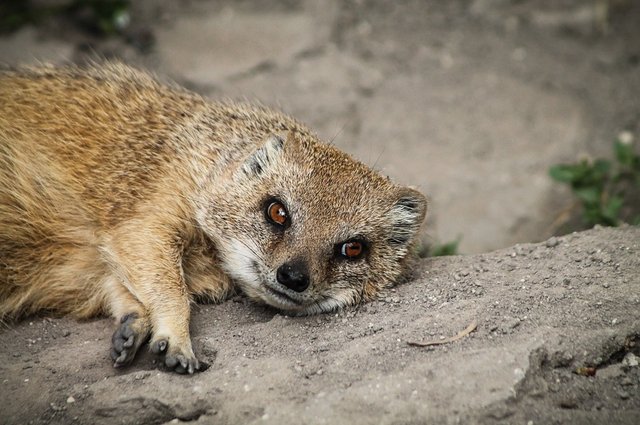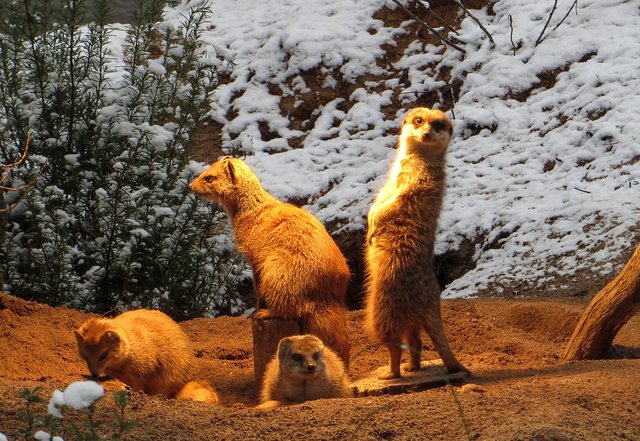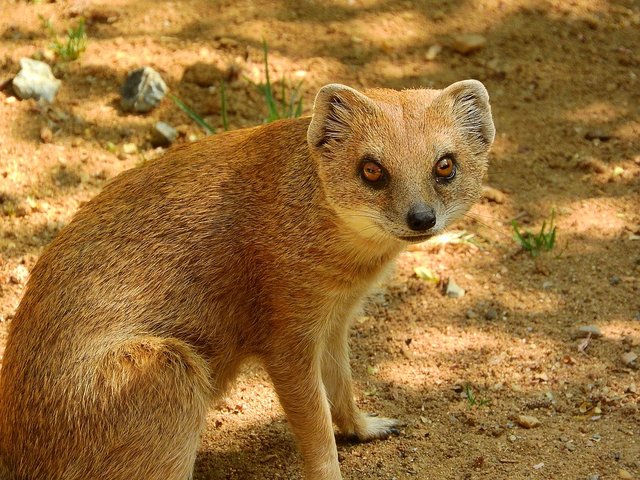Today we are going to discuss some facts about Mongoose which is one of the most lethal animals on the planet with extraordinary survival instincts. Mongooses are famous for their battle against the deadly snakes like Cobra, Black Mamba etc. The story of young Mongoose named "Rikki Tikki Tavi" also made Mongooses famous. So without wasting further time let's enjoy some cool facts of Mongooses.

Introduction:
Mongooses are carnivorous mammals found mainly in Africa, southern Asia and southern Europe. Mongooses were introduced to some other parts of the world like the Caribbean and Hawaiian islands to control snakes. There are over 30 species of Mongoose and they belong to the family Herpestidae and member of the superfamily Feliformia (Cat-like carnivores). They are generally terrestrial but some semi-aquatic Mongooses are also found. Mongooses have short legs and long bodies with a pointed nose.
The size of their body ranges from 7 inches to 2 foot. The Dwarf Mongoose is the smallest of its kind which is 7-10 inches long and the white-tailed Mongoose is the longest which body measures about 18-28 inches long. Their bodies are covered by brown or grey grizzled fur.
Mongooses live in treetops and burrows made up of complex tunnels. They are amazing predators with extraordinary survival instincts. They normally feed on reptiles, insects, frog, birds etc. Some Mongoose were also seen eating fruits, nuts, and seeds as supplements. There are some creative hunters among them who shows creative hunting styles like breaking eggs by throwing it against a solid object with their forepaws.
Now let's move on to the main part of our post.
Mongoose Facts:
1. Escort Service
Mentorship can be seen in Banded Mongoose of sub-Saharan Africa. Unrelated adults are known as 'escorts' who feed and educate the new pups. The escorts are mostly male Mongoose. A newborn pup will follow an adult for about two months until they can find food on their own. These escort members are often seen looking upon individual pup and but all pups have an escort.
During the time of association, the escorts protect, carry, groom, and play with pups. The pups which are escorted were not bigger nor in better condition than the non-escorted pups but they are more likely to survive at the end of the association period.
2. Gang of Mongooses
Some species of Mongoose lives in solitary while some species live in groups known as 'packs', 'mobs' etc. These packs can have up to 50 members. Sometimes these groups may be lead by an alpha male and female.
Mongooses live in a co-operative society where everybody has their own job. Some of them are hunters, while some stay behind and look upon the pups. The older and infirmed membered are nurtured by the entire pack. They have a good behaviour of taking the food back to their home and they are shared by all.

Want to know a heroic act of this 'Mobs'?
The packs of Banded Mongooses has shown great co-operation among their group members. They have a unique defence mechanism which is known as 'mobbing' against predators. If a predator attacks their group then the entire pack charge against their predator as one. They will scream, holler while charging. Some members will rise up while some will sink down creating the illusion of a big animal.
3. They have Rectangular Eye Pupils
Mongooses also have rectangular eye pupils like Goats and Sheep. While sheep and goats are considered as prey, Mongooses are both prey and predator. There are no vertical slits in rectangular eyes which helps to survey the surroundings more accurately. Animals having rectangular eye pupils have a wider viewing area and reduces the amount of sunlight and glares.
So it's hard to sneak up on a Mongoose.

4. Excellent Hunters
Mongooses are very fast and have a strong sense of smell, eye. Their extra ordinary reflexes help them to dodge bites from snakes and scorpions. Mongooses feed on reptiles, birds, insects, crab etc. Mongooses have razor sharp teeth and long claws which helps them to catch their prey (Mongooses have non-retractable claws which means they can't hide them).
5. Serpent Slayers
Mongooses are warriors. They are so brave that they don't hesitate to fight against deadliest snakes (like King Cobra, Black Mamba etc), which are one of the most lethal animals of the planet.
How a Mongoose wins a battle against a venomous Snake?
Mongooses have a keen sense of smell and strong eyesight. Moreover, Mongooses have super fast reflexes which help them to dodge a snake bite (A snake can strike in half the blink of an eye then imagine the reflex speed of a Mongoose).
Are Mongooses immune to Snake Venom?
Mongooses are not completely immune but resistant to snake (particularly cobra) venom. The agility and thick coats help them to dodge a snake bite most of the time. But even if a snake bites a Mongoose they will not die (but may become sick) due to their modified acetylcholine receptors which makes the venom bounce off the muscle cells, causing no harm. But repetitive bites can be fatal.
6. Surveillance call
Mongooses use alarm calls in response to threats. They produce this alarm calls to warn other group members about the upcoming danger. Species of Mongoose which lives in groups are seen using these alarm calls. The one who makes this alarm calls are known as the sentinel, group members take turns and do the sentinel duty. After hearing the alarm call members of the group rush to the nearest burrow for safety.
The more interesting thing is that this alarm calls can be specific. Some calls are just general while some can be urgency based, indicating the threat level and some can be predator-specific. Sometimes the calls can be a mixture of both urgency-specific and predator-specific. The type of species and distance of the threat can also be transmitted by the alarm calls.
7. Scent Marking
Mongooses use scent to mark their territory and to represent their reproductive status. They use the secretion of their anal gland which has an unpleasant scent. Mongooses which lives in packs defecate in the same place making it a pile. This strategy is used to show the invaders that a large animal lives in that territory.
Some Mongooses also use handstand scent marking to seem bigger.
8. Mongooses give birth at the same time
According to the research by Michael Cant, Mongooses which live in packs Synchronize Births. Female mongooses give birth at the same time to ensure the safety of their pups. The older females who com-dominate groups often kill the babies of younger female mongoose as they don't want any competitor for their own kids. But in the case of synchronized birth its hard to kill any newborn because they can't identify whose baby belongs to whom.
9. And Here Comes the Grooming
Like some primates, the Indian dwarf Mongooses have seen grooming each other. Mongooses which lives in groups have a sentinel who looks out for dangers and gives an alarm call when it finds a threat coming in their territory. In a study, it is found that the Sentinel has received more groom for their service.
Warthogs who are potentially a dangerous animal have seen groomed by banded Mongooses. Warthogs have been observed lying down allowing the mongooses to clean them up. In this mutual relationship, the mongooses get to eat bugs and the warthogs get clean.
Congratulations! This post has been upvoted from the communal account, @minnowsupport, by rejakul from the Minnow Support Project. It's a witness project run by aggroed, ausbitbank, teamsteem, theprophet0, someguy123, neoxian, followbtcnews, and netuoso. The goal is to help Steemit grow by supporting Minnows. Please find us at the Peace, Abundance, and Liberty Network (PALnet) Discord Channel. It's a completely public and open space to all members of the Steemit community who voluntarily choose to be there.
If you would like to delegate to the Minnow Support Project you can do so by clicking on the following links: 50SP, 100SP, 250SP, 500SP, 1000SP, 5000SP.
Be sure to leave at least 50SP undelegated on your account.
Downvoting a post can decrease pending rewards and make it less visible. Common reasons:
Submit
Congratulations @rejakul! You received a personal award!
You can view your badges on your Steem Board and compare to others on the Steem Ranking
Vote for @Steemitboard as a witness to get one more award and increased upvotes!
Downvoting a post can decrease pending rewards and make it less visible. Common reasons:
Submit